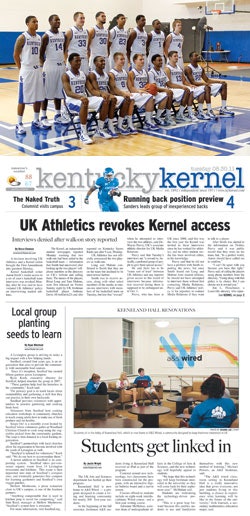Aaron Smith was looking forward to joining a dozen or so members of the mainstream media at a scheduled gathering of University of Kentucky men's basketball players, each of whom would be available for eight-minute one-on-one interviews.
 Denied the opportunity to cover a men's basketball media event, the Kentucky Kernel wrote instead about its run-in with the UK athletic department. (Team photo by Charles Bertram/Lexington Herald-Leader, Newspaper cover image courtesy of the Kentucky Kernel)
Denied the opportunity to cover a men's basketball media event, the Kentucky Kernel wrote instead about its run-in with the UK athletic department. (Team photo by Charles Bertram/Lexington Herald-Leader, Newspaper cover image courtesy of the Kentucky Kernel)Aaron Smith was looking forward to joining a dozen or so members of the mainstream media at a scheduled gathering of University of Kentucky men's basketball players, each of whom would be available for eight-minute one-on-one interviews. It was the first time a representative of the Kentucky Kernel, UK's daily student newspaper, had been invited to the annual event.
But that invitation - the product of a rapport established between Smith, the Kernel's managing editor and second-year basketball writer, and the media relations staff within the UK athletic department - was rescinded on the eve of the Aug. 30 presser. Based on a tweet by freshman forward Anthony Davis welcoming two walk-ons to the team, Smith had looked up the students' phone numbers, called them and requested interviews, only to be told by the players that he had to talk to athletics media relations first. DeWayne Peevy, UK's senior associate athletic director for men's basketball communications, informed Smith later that day that he was taking back the invite as punishment for violating athletic department policy.
That night, the Kernel posted an online account of Smith's situation, and a Twitter-fed free-press firestorm ensued. The following day, Kentucky First Amendment lawyer Jon Fleischaker was quoted in Associated Press reports as calling it "so clearly a violation of First Amendment rights for the university to condition access on gathering or publishing information the way the university wants you to do it." Associated Press Managing Editors president Hollis Towns sent a letter to UK athletic director Mitch Barnhart urging him to restore Smith's access and stating that the revocation "amounts to no less than an attempt to bully the newspaper into submission and to censor news concerning operations of the University of Kentucky athletic department."
"That's what we felt, too - that they were trying to limit us," says first-year Kernel editor-in-chief Taylor Moak. "As students, we're sensitive to the fact that the university was just trying to control a child that had been disobedient. We didn't appreciate that."
Athletic department media-relations specialists need to appreciate the role of student news organizations, as well as their rights. Speaking to a group of two dozen journalism students and faculty members during a Sept. 12 UK forum on the issue, longtime Kentucky sports columnist Billy Reed stated, "The real issue isn't about them being concerned about interview requests. It's about control. They want to control their product ... because this is a big business."
To be fair, the UK athletics media guide clearly spells out the department's access policy: "All interviews with basketball players or staff members must be arranged through the Media Relations office. Media should never contact a player or coach directly."
Peevy, who cited a conflict when canceling his own appearance at the forum, stepped into a gray area when retaliating against Smith in order to, in Peevy's words, "teach him a lesson without costing him anything."
"There is definitely a First Amendment right to gather news free from government interference, and so the question is whether the government can retaliate against you," says attorney Frank LoMonte, executive director of the Student Press Law Center in Arlington, Va. "Can it punish you for non-disruptive, lawful newsgathering activity? I think there's a good argument that it can't."
The sports context is unique, according to LoMonte, since the power and control that college athletic departments wield can be formidable. Because state university coaches are more insulated than most government employees, and can likewise insulate their players, student journalists are relatively easy to shut out. And it's been going on for decades. In his 1994 book From Red Ink to Roses: The Turbulent Transformation of a Big Ten Program, Rick Telander relays the story of University of Wisconsin student journalist Barry Baum, who wrote an article in The Daily Cardinal about "possible abuse" of a football player at practice. The UW sports information director promptly informed Baum that he would no longer be allowed to speak to coaches or players. "In truth, if you questioned him closely, Baum might not even be sure what the First Amendment says," wrote Telander. "He just knew he wanted to be a hard-driving, shoot-from-the-hip journalist."
"In the case of a football coach, I think there's a line between saying, 'You can't come into the coach's press conference at all,' which might be a violation of the First Amendment, versus, 'The coach won't call on you to ask a question,' or, 'The coach won't grant you an exclusive interview,'" LoMonte says. "He has the right, personally, to decide who gets an exclusive with him. He doesn't have to extend you any courtesies or favors. But what he probably can't do is have you kicked out of the press box or thrown off the sidelines or excluded from a generally open media event. From a First Amendment standpoint, that's where the line is."
But is there any real consequence for crossing that line? The timeline in cases such as Kentucky's often makes a court injunction impossible, according to LoMonte, and Smith's so-called punishment was never meant to extend beyond the next day's event, anyway. (Smith covered a Sept. 4 event featuring coach John Calipari.) "The real remedy is exactly what happened in the University of Kentucky case, which is that the university suffers a black eye in the media and gets a round of condemnation by people in the press, and that's what they have to live with," LoMonte says. "It becomes a question of whether the agency is willing to endure a beating or not. If they're willing to endure a beating, then they probably get away with just about anything."
Peevy declined AB's invitation to discuss the issue further, offering only, "The Kernel and UK are fine."
"That's my hope," Moak says. "I know after everything that happened at the end of August they told us that, moving forward, they were going to continue to treat us professionally. We hope that remains to be true."
Moak adds that the Kernel has typically adhered to the media-relations policy (only straying from it once before, in 2009, when a writer contacted a student-athlete directly for reaction to the firing of UK men's basketball coach Billy Gillispie, apparently without incident). According to Joe Hornstein, associate athletic director for public relations and communications at the University of Central Florida and the next in line to serve as president of the College Sports Information Directors of America, having such a policy is common practice among athletic departments. (AB's requests for comment from CoSIDA's current president and its executive director were not immediately answered.)
"I certainly think [Peevy] has a right to set policies for how people get credentials, how they behave at the press table or press box at games, or things like that," said Reed, an executive scholar in residence at Georgetown College, while addressing the Sept. 12 forum audience. "But he is far exceeding his authority in thinking he can set policies for how reporters cover sports. It's preposterous to me that the athletics department thinks that they can prevent one student here from talking to another student."
When asked if she thinks UK athletics treats Kernel staff any differently than mainstream media representatives, Moak says not typically. "But then when this happened, it did raise the question of whether they would have done this" to another media outlet, she says. "This time, it seemed like they were just trying to punish us because we didn't do what they wanted us to do."
Moak adds that the Kernel contacted several First Amendment experts for advice and to enhance its own coverage, ultimately deciding to do nothing about the situation other than write about it - which, of course, is well within the Kernel's rights. The pen, after all, is mightier.
"What I have told the people at the University of Kentucky is if you're precluded from effectively covering the sports part of the athletic department, then you should use that time and those resources to cover the business side of the athletic department," LoMonte says. "Go out there and investigate how they're spending their money, what classes the athletes are taking and who's getting complimentary football tickets, and I would think in very short order the sports information department will be begging you to come back and do feature stories about their walk-on players."





































